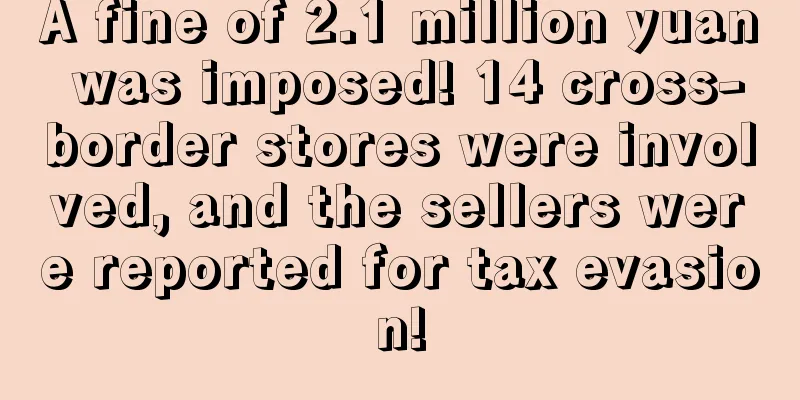|
▶ Video account attention: cross-border navigation Recently, the news that several well-known internet anchors were punished by relevant departments for tax evasion and tax avoidance has caused a sensation in society. The sky-high fines have made people see that the country attaches great importance to and cracks down on illegal incidents. Wei Ya's 1.3 billion yuan fine was like a fuse, exploding more tax evasion cases. It is understood that thousands of online anchors have taken the initiative to self-examine and pay back taxes. The tax bureau said that those who fail to conduct thorough self-examination and rectification, refuse to cooperate or have serious circumstances will be severely punished according to law. ▲ The picture comes from the seller communication group While the cross-border sellers were enjoying the show, no one expected that this "tax compliance fire" would spread to cross-border e-commerce companies. A cross-border e-commerce company was fined 2.1 million yuan for tax evasionIt is learned that recently, China Taxation News reported a cross-border e-commerce tax evasion case: The First Inspection Bureau of the Hangzhou Taxation Bureau of the State Administration of Taxation successfully investigated and dealt with a cross-border e-commerce tax evasion case through data integration and analysis. It is understood that the case originated from a letter of complaint received by the Hangzhou Taxation Bureau. The letter stated that a cross-border e-commerce company in Hangzhou had set up two sets of internal and external accounts, and there was a problem of concealing income and underpaying taxes. The letter also attached screenshots of the company's internal emails and reports, showing that the company's personnel sent and received two sets of accounts via emails. After receiving the report, the Hangzhou Taxation Bureau immediately organized an inspection and initially obtained relevant information about several persons in charge of the company involved. At the same time, the inspection team found that the company had disclosed its sales in the relevant years, and compared and analyzed the relevant information with the company's declared data in the tax collection and management system. The inspection team determined that the company was seriously suspected of concealing income. After investigating and obtaining relevant information, the inspection team conducted a surprise tax inspection on the company and eventually seized a USB flash drive containing the information involved in the report through the general ledger accountant's computer. However, faced with evidence of off-book income, the financial personnel of the investigated companies neither acknowledged the off-book income reflected in the internal account statements nor explained the source of the data in the statements. Soon, the inspection team found 14 stores related to the companies involved in the case on six e-commerce platforms including AliExpress and Amazon, and discovered that the operating conditions reflected by these stores were relatively close to the off-book income statements obtained by the companies involved. Faced with irrefutable evidence, the company involved admitted that it had concealed its income to evade corporate income tax, and cooperated with the inspection team to retrieve the company's business system and sales lists on the e-commerce platform. In the end, the company was required to pay a total of 2.1 million yuan in taxes and late payment fees in accordance with the law. Looking back at the inspection team's surprise inspection of the company, there are two details worth noting: 1. Deleted data is recovered by the inspection team 2. Data integration confirms off-book income In other words, the company's personnel tried to evade the inspection team with other excuses and refused to admit the fact of tax evasion. However, there is no such thing as a wall without cracks in the wall. With the efforts of the inspection team, the company's tax evasion was proven to be irrefutable, and it had no choice but to accept the punishment of the relevant departments. This case also sounded a wake-up call to all cross-border sellers. Although the transactions engaged in the cross-border e-commerce industry are special, it does not mean that this industry is unregulated! Don’t take chances, cross-border e-commerce is also regulated!The report pointed out that although the investigation of this case was guided by specific reporting clues, the ability to quickly and accurately uncover the illegal facts of the companies involved in hiding their income and evading taxes was inseparable from the regulatory role of integrated application of big data in cross-border e-commerce. At the same time, Chen Tingting, director of the First Inspection Bureau of the Hangzhou Taxation Bureau, pointed out that cross-border e-commerce is an emerging industry that has developed rapidly in recent years with the support of the state. Cross-border e-commerce companies can enjoy the VAT export duty-free policy after completing various filing and declaration procedures with the customs in accordance with regulations. For cross-border e-commerce companies, on the basis of promoting their development in accordance with the law, we must increase the publicity and guidance of tax compliance, and guide them to handle tax-related businesses in accordance with the law. Therefore, reflecting on this cross-border e-commerce tax evasion case, it is essentially a manifestation of cross-border enterprises pursuing profits, ignoring policies, and evading corporate income tax by concealing income. Yesterday, taxation authorities in Beijing, Guangdong, Shanghai and other places successively issued notices, requiring celebrities, artistes and internet anchors to promptly conduct self-inspections and proactively report and correct tax-related issues. The relevant notice pointed out: Paying taxes according to law is the obligation of every citizen. In order to further create a good environment for paying taxes in accordance with the law and in good faith, celebrities, internet anchors, etc. who have not paid attention to their own tax-related issues or have not conducted adequate self-inspection and rectification should promptly conduct self-inspection in accordance with tax laws and relevant notification requirements . For those who still refuse to conduct self-inspection and self-correction or who do not conduct self-inspection and self-correction thoroughly, the tax authorities will deal with them seriously in accordance with the law. Although the notice did not emphasize cross-border e-commerce companies, looking at the major events that have occurred in recent days, sellers must pay great attention to such issues. If other sellers are not clear about the tax policy, it is recommended to check the relevant information to avoid illegal and irregular behavior. Tax compliance must be achieved in order to provide a protective umbrella for the long-term development of the company.
|










